- Updated: January, 2024
- Bartek
- General
- Torunaments
- Beginner
- Cash Game
There are two kinds of poker players in the world: Those who know poker math and those who don’t.
Can poker mathematics help you become a better poker player?
The short answer is yes. However, it’s not as simple as just knowing the math. You must have a good understanding of other poker aspects like the mental game, table selection, reading poker tells, etc.
Additionally, you must know how to apply the math to poker, and you must do it quickly because the time to make a decision at a poker table is limited, at least online for now.
Poker is an entertaining game, especially when you win! There is no doubt about it! However, it’s also a numbers game. Whether you play low-stakes or high-stakes, cash games or MTTs, online or in a casino, knowing the poker math, odds and probabilities will give you the necessary edge over your opponents.
What are the best ways to improve your poker math?
Reading poker books is one of the best ways to do it, but you must never forget to study what you have read and implement it in your game.
Which are the best poker math books?
Below, I have carefully selected the seven best poker math books to help You take your poker game to the next level.
The reviews are based on my honest judgment and the opinions of other poker players who reviewed those books on various websites. This way, we can ensure that the reviews are as little subjective as possible.
Although, always remember that any “favorite book” is a personal judgment. And one more thing, when you buy something using the affiliate links in this post, I may earn a small commission at no additional cost to you. This helps me to create more high-quality content for you. Thanks!
Table of Contents
Practical Poker Math: Basic Odds & Probabilities for Hold'em & Omaha, Pat Dittmar
Positives
♥ Interesting, historical perspective of Game Theory
♥ Handy poker odds tables
♥ Well explained starting hands
♥ Calculations are shown in an easy to understand, step-by-step way
Negatives
x The title suggests that the book also covers Omaha. However, it only talks about Omaha Hi-Lo
x Too many calculations
x Not for advanced players with extensive poker math knowledge
The author, Pat Dittmar has been an advisor to many known poker websites and has played professionally for over 20 years.
The vast majority of the 246 pages cover probabilities, odds, derivations, and calculations of various scenarios.
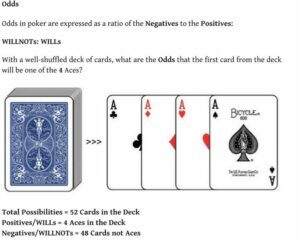
Practical Poker Math includes five sections:
- Introduction to Game Theory in Poker
- The Basic Calculations
- Odds in Texas Hold ’em
- Consolidated Odds Tables
- Odds in Omaha Hi-Lo
The GTO part and its history are very interesting, especially for anyone new to this concept.
“Game Theory and Poker
More than the study and application of a set of principles, Game Theory in poker is primarily about two goals:
1. The study and understanding of the opposition
2. The development of an efficient strategy to dominate the competition.
Can a poker math book, written in 2008, still be valuable to any poker players today?
Pat Dittmar has written this book for beginners and semi-pro players. However, there is not much information that advanced players could gain from it these days. Maybe back in 2008, when the skill level was lower than today, the book could be aimed at pro players, but this is not the case today.
The book’s title suggests that it also covers Omaha, though it only talks about Omaha Hi-Lo.
On the positive side, all the calculations included in Practical Poker Math are easy to understand and explained step-by-step. Additionally, the provided poker odds tables are convenient, and the starting hands are explained very well.
I can recommend this valuable read to any beginner or intermediate players, and the advance/pro players should look for a more recent and advanced book.
Texas Hold'em Odds and Probabilities, Matthew Hilger
Positives
♥ Real hand examples of various poker players from author’s forum
♥ Test Your Skill sections at the end of each chapter
♥ Very well written and easy to understand
♥ There is a preview available on Amazon
♥ Extensive tables
Negatives
x Charts in the Kindle version are unreadable
x About half of the book talks about Limit Holdem
About Matthew Hilger
The author, Matthew Hilger, runs a website and poker forum, InternetTexasHoldem. His results include nine cashes at the WSOP, three of them in the main event. Matthew is the 2002 New Zealand poker champion. In 2007, he made back-to-back final tables in the Aussie Millions Championships.
What’s included in this poker math book?
The author focuses on addressing Limit Hold ’em, NLH cash games, and NLH tournaments in the book. The Limit Hold ’em part covers at least half of the book, so if you are not into Limit games, you should take that into account.
At the end of each chapter, Matthew includes:
- ‘Chapter Review’ section
- ‘Test Your Skill’ section,
which is always very useful, because it helps you memorize and practice everything you read.
On the negative side, the charts in the Kindle version are unreadable. So, if you buy this book, and the charts are important to you, then get a hard copy.
Nevertheless, I can recommend the book to beginner or intermediate-level players.
Texas Hold ’em Odds and Probabilities has the numbers you must know when playing poker. If you play against a player who understands this material and YOU don’t, you’re at a disadvantage. Furthermore, if you find yourself having problems understanding some of the concepts, re-read them to digest them fully.
The Math of Hold'em, by Collin Moshman and Douglas Zare
Positives
♥ Separate chapters on Game Theory and poker software
♥ Suitable for players that are into advanced poker mathematics
♥ A free book preview available on Amazon
Negatives
x High price
x Lengthy explanations
x Some concepts are difficult to understand
x Low-quality graphics in the Kindle edition
About Collin Moshman and Douglas Zare
Collin Moshman and Douglas Zare want you to learn poker math in a solid, not volatile way. For that reason, The Math of Hold ’em is 408 pages long! Both writers have mathematics degrees and play poker professionally.
Some of the important elements of poker covered in this book include:
- Expected Value
- Probability
- Logic
- Game Theory
- Tournament Equity
- Bankroll Management
- How to get the advantage of the poker software
The way the authors explain some concepts (i.e., pot odds) could seem over-complicated to some readers. This is probably because both authors are mathematicians:
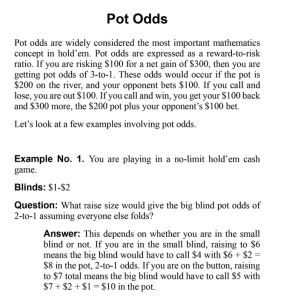
If you buy The Math of Hold ’em, plan on spending a lot of time solving the meaning that the authors intended. Another shortcoming of the book is the low-quality graphics in the Kindle edition.
Nevertheless, I can recommend the book to any advanced players that are into complex math and believe that “the more math, the more money.”
Mastering Poker Math, Volume 1: Become a Feared Shark in Texas No-Limit Hold'em, by Chuck Clayton
Positives
♥ Clear math explanations
♥ Shortcuts to calculate Poker Math
♥ Beautifully written and concise
♥ The Charts, tables, and infographics are easy to understand
♥ Well organized
♥ Free with Kindle Unlimited subscription, in the US
♥ Free tracking spreadsheets
Negatives
x Not enough real hand examples
x Not for very advanced/pro players
You will discover quick & straightforward poker strategy shortcuts. Mastering Poker Math, Volume 1 gives easy ways to determine if your decisions are mathematically accurate. The author transforms some of the old poker theory methods into new ones and shows them in an easy-to-understand way.
“All players experience bad beats by other players. The bigger the pot, the more intense and painful the experience. Over time, this intensity of their pain from repeated bad beats is seared into their memory. This causes many players to think that suck outs happen to them more often than they do. This is what is known as selective memory. It is also faulty logic since the probabilities don’t care what you, I, or any other player’s think. The math is dependable and consistent.”
The book also goes beyond the mathematics of poker. It shows a bit of history, psychology, reading your opponents, recognizing patterns, and more. You can read a full review together with a Table of Content, quotes, and more here
Have you ever wondered why no-limit hold’em players often bet a half pot instead of some other amount of chips? This book will explain it to you.
The book contains 382 pages of solid math, written by two mathematicians:
- Bill Chen received a Ph.D. in Mathematics from the University of California. He won two WSOP bracelets in 2006. Bill also took part in Poker After Dark and was PokerStars ambassador for nine years.
- Jerrod Ankenman received an MS in Applied Mathematics. He won a WSOP bracelet in 2009.
Generally, the authors have sought to make seemingly complicated topics accessible to players without a solid mathematical background.
“The primary goal of our work here is not to solve game theory problems for the pure joy of doing so; it is to enhance our ability to win money at poker.”
The Mathematics of Poker includes five main sections:
Part I: Basics
Part II: Exploitive Play
Part III: Optimal Play
Part IV: Risk
Part V: Other topics
Recommendation
Chen and Ankenman are trying to make poker math look effortless and accessible to all players. However, If you’re not into numbers or a beginner poker player, I’d recommend starting with another book from our list. For instance, the Essential Poker Math, which is the best book on this list.
Moreover, some readers agree that this book is more complex than you need at the table.
Nevertheless, if you are a math wiz or advanced poker player, this book is for you. The Mathematics of Poker will provide you with the mathematical logic and tools to analyze a large number of data and create an unbeatable strategy. As David Sklansky said about the book:
“For those who think poker math is only about probability, pot odds, and straightforward, rote Play, think again. Chen and Ankenman do a terrific job explaining how math can, among other things, show you exactly how to mix up your Play in such a way that even champion players cannot get the best of you. Especially those who don’t read this book.”
If you decide to read it, you will probably find yourself lost at some point in the book. Again, if this happens, re-read the text or take a break and come back to it.
Besides, the math in the book is solid, but the writing style is hard to understand.
Get a FREE list of all the poker books ever written!
Poker Math That Matters Simplifying The Secrets Of No Limit Hold'em, by Owen Gaines
Positives
♥ Written in a language that's easy to read and understand.
♥ Suitable for non-mathematically inclined players
♥ There are over 100 quizzes to test your skills.
♥ Very practical
♥ Provides various ways for calculating odds based on your opponent's range.
Negatives
x Suitable mainly for beginners and intermediate players.
x The author doesn't emphasize game theory.
Poker Math That Matters is the second-best poker in our ranking. Let’s see if it can teach You how to become the Archimedes of Poker 🙂
Have you ever looked at poker players and were curious about how they’ve become successful? While it may sound like a loud statement, this book has helped many online players learn the critical math elements of poker.
A few words about the author
Owen Gaines, also known as QTip is a professional poker player with numerous years of gambling experience. Moreover, he has written four books that have received several excellent appraisals. And while being an expert in the poker field, the author tries to find a way to share his experience and tips for all player levels.
Who is this book for?
Filled with tips and quizzes, you can learn all you need to know to improve your game.
Praise and critique
‘Poker Math That Matters’ will change your outlook on poker strategy. The book is written in an easy-to-read style. As the author says himself,
“I designed this material in an attempt to not leave any reader behind.”
Hence, making sure that players with different experiences can find new things to learn. Additionally, the text includes many concepts and strategies Owen has obtained in his professional career.
Besides, players can test their skills from more than 100 different quizzes and sample problems.
While the book includes some unique tips and authors’ experiences, it also has many well-known poker math elements that experienced players should already know. Therefore, Poker Math That Matters suits more beginners and intermediate players rather than seasoned poker players.
The best overall poker math book
Essential Poker Math, Expanded Edition: Fundamental No Limit Hold'em Mathematics You Need To Know, by Alton Hardin
Positives
♥ Well written and is easy to understand
♥ Free with Audible trial in the US
♥ Free with a Kindle Unlimited membership in the US
♥ Cheap ebook version - $5.45
♥ Includes real-life examples
♥ Free Enrollment into eLearning Online Course – you have to email Alton with the proof of purchase
♥ The exercises are easy to follow and understand
♥ Well structured
Negatives
x Very repetitive
x The large typeface may be hard to read
This book is number one on our list for a reason! And you can have it FOR FREE! The only thing you need to do is to subscribe for a trial with Kindle Unlimited or Audible Plus (you can cancel the subscription at any time with no extra cost). This deal is definitely +EV!
‘The Essential Poker Math’ is the most popular and best-rated book on poker mathematics. The author, Alton Harding, has taken the math behind poker to a whole new level with this Expanded Edition.
The book will teach you the poker math needed to improve your game and beat your opponents. Its author, Alton Harding, is an acclaimed poker instructor and an experienced professional gambler.
Besides, Alton is also the chief of Boom Information, which provides online Poker training programs and live seminars for winning at poker.
Book Summary
The book is all about the fundamentals of poker. It will teach you:
- probabilities and odds,
- pot equity,
- pot odds,
- implied odds,
- the Rule of 2 and 4,
- expected value (EV)
- pre-flop and post-flop poker math theories include pre-flop all-in situations, set-mining, 3-bet bluffing, betting with the best hand, steal attempts, semi-bluffing all-in bluffs, and hero calls.
- to conduct fundamental and intermediate expected value calculations and use card combinations (combinatorics).
- and much more
‘The Essential Poker Math’ begins with a series of fundamental concepts, which the author explains in an easy-to-understand way. Exercises and specific scenarios follow the concepts.
Who is this book for?
If mathematics is not your friend, The Essential Poker Math will be perfect for you. Harding explains the mathematical theories in a way that almost anybody should understand. Additionally, the exercises are easy to follow and comprehend.
Although Harding has written the book in a very clear and simple writing style, it is very repetitive in some parts and could have been summarized better. However, it is an ideal guide to studying and practicing all the essential math skills you need to excel in poker.
Recommendation
Despite the print length of 277 pages, Essential Poker Math Expanded Edition is great value for money. You can have the ebook version for as little as $5.45 on Amazon. Moreover, it has a 4.6 stars out of 5 rating on Amazon, which means it can be an excellent investment.
I highly recommend it to anyone who wants to improve or refresh their poker math knowledge.
Are there any poker math books I have left out?
If yes, then please let me know and I will review it and consider adding it to the rankings.


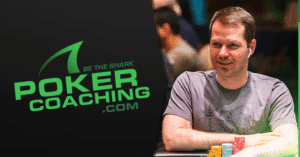


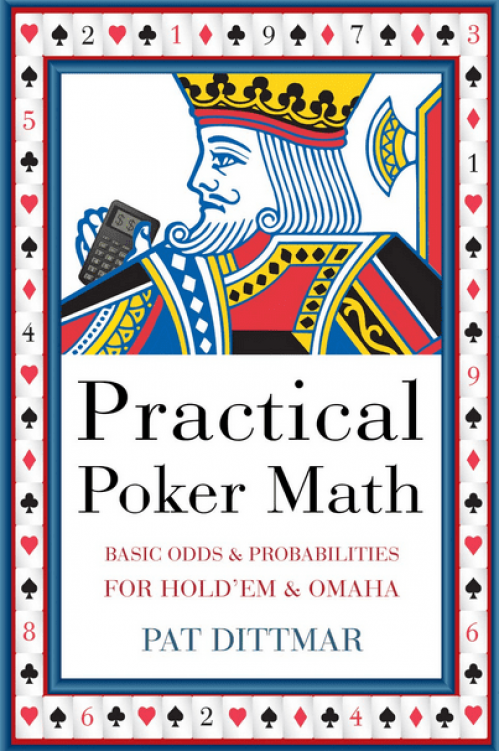

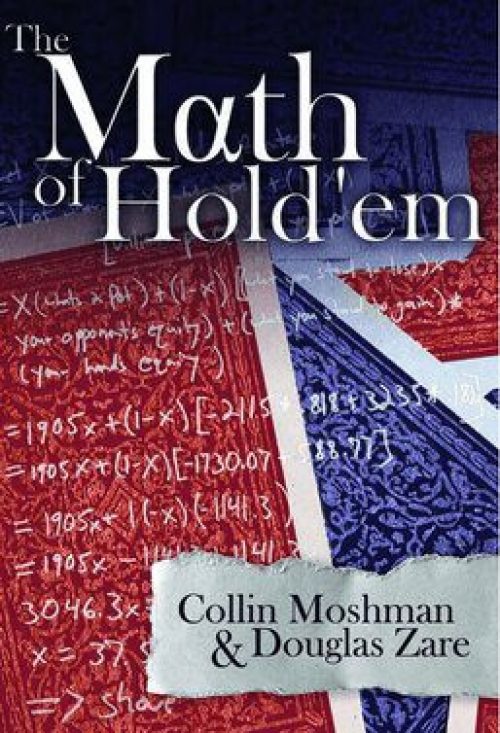
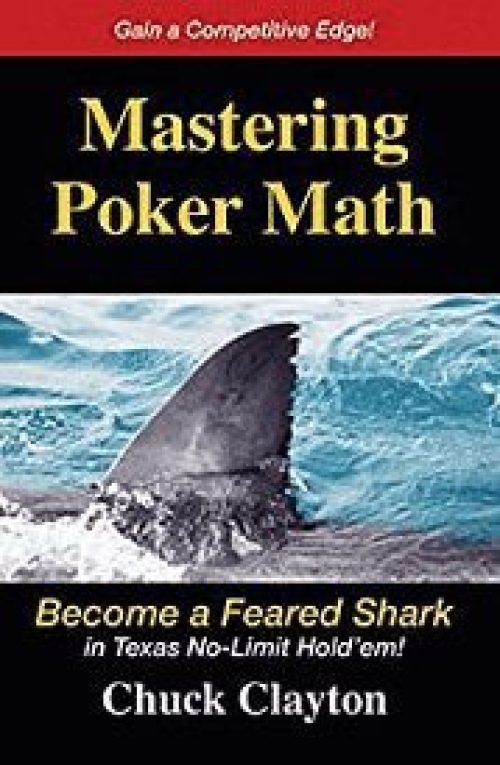
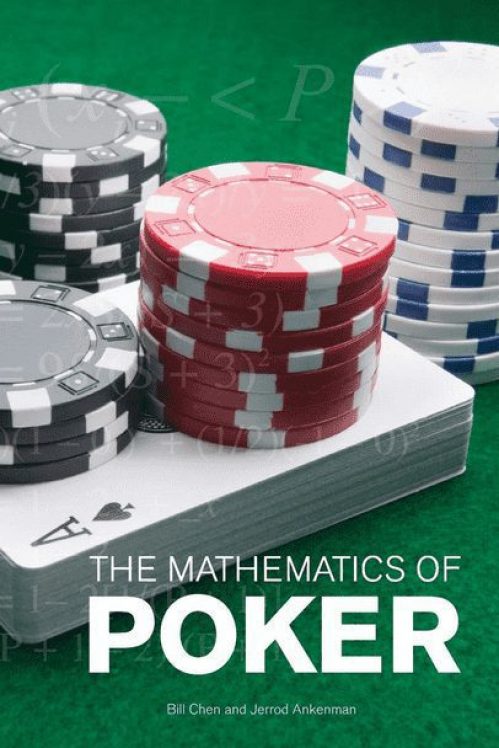
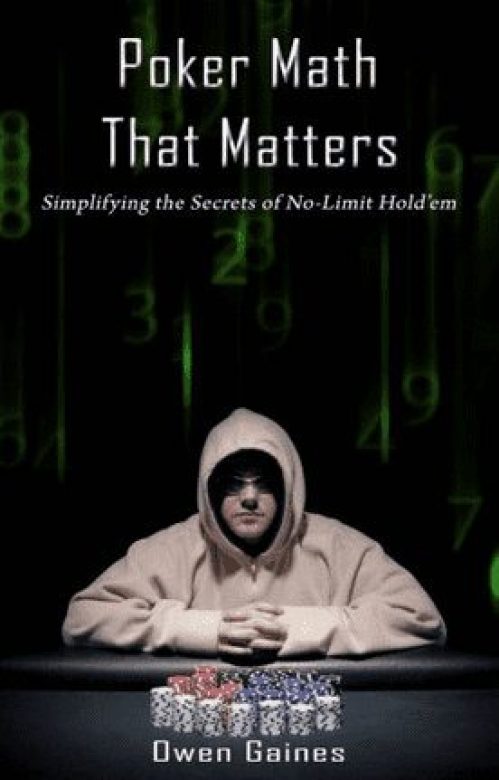
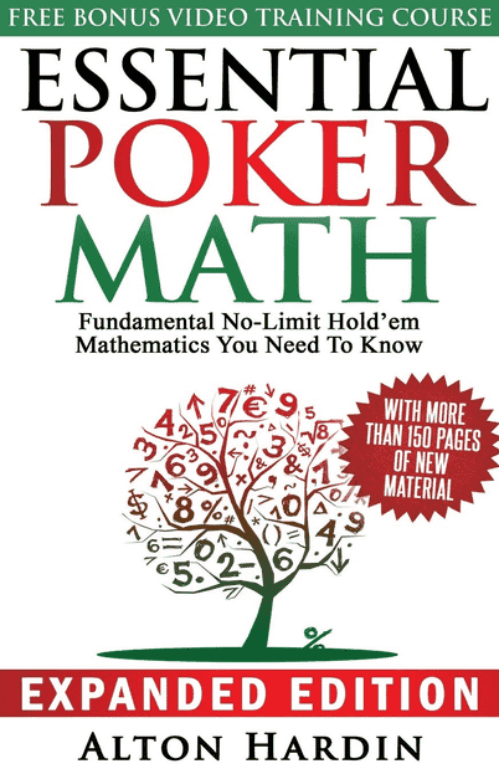






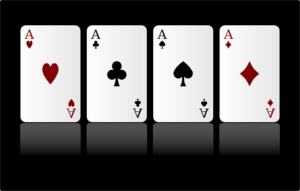

TEXAS HOLD ‘EM POKER TEXTBOOK by Thomas M. Green
Thanks for the suggestion Thomas.
Two of the most important ones by far. Getting the Best of It by David Sklansky and my Gambling Theory and Other Topics.
Thanks Mason 🙂 I will check both books.